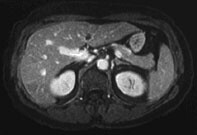For nonideal candidates, resection linked to improved outcomes versus some alternatives
TUESDAY, July 28, 2015 (HealthDay News) — For patients with hepatocellular carcinoma (HCC), not resecting ideal candidates for resection is associated with increased mortality, according to a study published in the Aug. 1 issue of Hepatology.
Sasan Roayaie, M.D., from Lenox Hill Hospital in New York City, and colleagues examined how frequently guidelines recommending surgical resection as the primary treatment for a single HCC were followed. Data were obtained from the multiregional BRIDGE cohort study, which included 8,656 patients from 20 sites. Patients were classified into four groups: 718 ideal resection candidates who were resected (A); 144 ideal candidates who were not resected (B); 1,624 non-ideal candidates who were resected (C); and 6,170 non-ideal candidates who were not resected (D).
The researchers found that during a median follow-up of 27 months, the risk of mortality was higher with treatments other than resection for ideal resection candidates (groups A and B). Portal hypertension and bilirubin >1 mg/dL were not associated with mortality in all resected patients (groups A and C). Resection correlated with better survival than embolization and “other” treatments, but was inferior to ablation and transplantation for all patients who were non-ideal candidates for resection (groups C and D).
“The study suggests that selection criteria for resection may be modestly expanded without compromising outcomes, and that some non-ideal candidates may still potentially benefit from resection over other treatment modalities,” the authors write.
Several authors disclosed financial ties to pharmaceutical companies, including Bristol-Meyers Squibb, which funded the BRIDGE database and data collection.
Copyright © 2015 HealthDay. All rights reserved.








